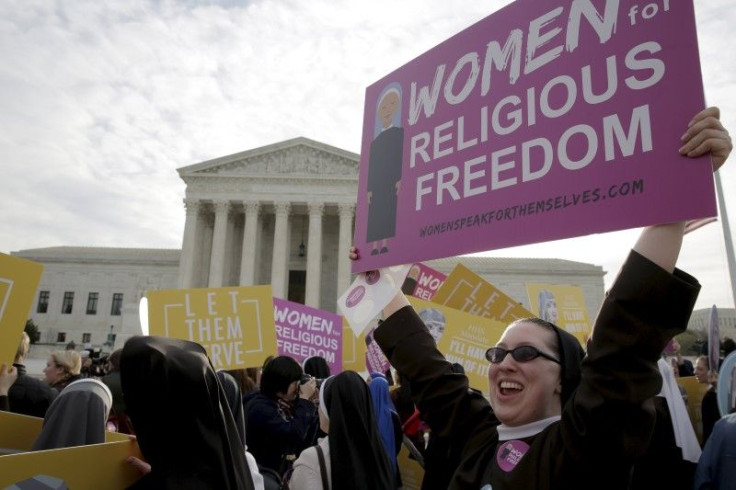The Latest Supreme Court Birth Control Case, Explained: What Religious Nonprofits Want And Who Could Be Affected

Eight Supreme Court justices heard arguments Wednesday in Zubik v. Burwell, the second case that has made it to the highest court in the country to challenge the Affordable Care Act's requirement that employer health plans cover birth control. It is the latest in a slew of legal challenges that could severely curtail women's access to reproductive health services in the United States, with repercussions not just for women and their families, but for the economy as a whole.
The case of Zubik v. Burwell is actually a combination of seven cases, all filed by religious nonprofit groups, that question the legality of the contraceptive mandate laid out in the Affordable Care Act. Under the healthcare law, which celebrated its six-year anniversary Wednesday, employer-sponsored health insurance must make a variety of birth control options accessible and free to women of child-bearing age.
In 2013, this provision saved women $1.4 billion, a study published in the journal Health Affairs found. Currently, 55 million women are estimated to be eligible for free birth control because of the law.
But religious groups that oppose the use of some contraceptives have argued that such a requirement violates the 1993 Religious Freedom Restoration Act. In the 2014 case Burwell v. Hobby Lobby, the Supreme Court decided on the basis of the 1993 law that for-profit religious businesses that objected on religious grounds to covering the cost of contraceptives could seek an accommodation from the Obamacare requirement.
All they had to do was fill out a form, and employees seeking birth control would be covered by a third-party insurer, with the government handling the process.
Now, the nonprofit religious institutions involved in Zubik v. Burwell argue that because simply filling out the form would trigger the process of a person obtaining contraception elsewhere, such an accommodation constituted a violation of their faith. Over 100 nonprofits have previously challenged this requirement, but eight federal appellate courts dismissed their claims. Only one, the 8th Circuit Court of Appeals, ruled otherwise, opening the door for a Supreme Court case.
Arguments at the Supreme Court on Wednesday touched lightly on the obstacles, both financial and logistical, that the accommodation already imposes on women.
"They have to sign up for a second plan and pay for a second plan," Solicitor General Donald Verrilli said in response to Justice Anthony Kennedy. "The whole idea here is to ensure that these employees get ... this care from their regular doctor as part of their regular health plan without these added obstacles."
So far, 10 percent of large nonprofits with 1,000 or more workers have given notice for an accommodation that requires women to obtain birth control separately, and 3 percent of all nonprofit firms with 10 or more workers have done so, according to the Kaiser Family Foundation.
Precisely how many women could be affected remains unclear, but if the court rules in favor of the plaintiffs, "Many workers and dependents may not receive contraceptive coverage because their employers will be exempt," the foundation wrote.
Legal scholars and reproductive health advocates alike have argued that a lack of access to contraception undermines women's ability to equally and fully participate in the economy. In 1978, Justice Ruth Bader Ginsburg, then a professor, said that in reproductive rights cases, what's really at stake is whether women “have the opportunity to participate in full partnership with men in the nation’s social, political and economic life.”
In the United States, half of pregnancies are estimated to be unintended. “An unintended pregnancy is virtually certain to impose substantial, unplanned-for expenses and time demands on any family, and those demands fall disproportionately on women,” noted the United States Court of Appeals for the District of Columbia in November when it dismissed the very challenge argued before the Supreme Court Wednesday.
Women use contraceptives for reasons besides family planning. For some, these medications are necessary "to regulate hormonal ups and downs, to manage painful conditions like endometriosis, and to prevent ovarian cysts," Nina Wells, a nurse, pointed out in an opinion piece Tuesday in STAT News. Without insurance, contraceptives can be prohibitively expensive. An intrauterine device, or IUD, can cost up to $1,000.
If the court, down one justice since the death of Justice Antonin Scalia in February, is split in a 4-4 tie, previous rulings by lower courts in the seven cases would stand, and whether a woman employed by a relevant religious institution would have access to contraception through an accommodation would depend on the region in which she lives.
Whatever the court decides, the yearslong feud over women's access to birth control is far from over. As SCOTUSblog reasoned in July 2015, even before the Supreme Court decided to hear Zubik v. Burwell, "There is very little reason to expect the two sides to find common ground on how this controversy should come out in the end."
After all, if the plaintiffs in Zubik v. Burwell objected to any accommodations that would ultimately grant women access to birth control, at what point would they cease? Supreme Court Justice Elena Kagan wanted to know Wednesday.
"Is there any accommodation that the government would offer that would in fact result in women employees of your clients, or students of your clients, getting healthcare as apart of an employer-based plan or a student-based plan, getting contraceptive coverage?" Kagan asked Noel Francisco, representing the Roman Catholic Archdiocese of Washington, one of the plaintiffs in the case. "Is there any accommodation that would be acceptable?"
The court is expected to rule on Zubik v. Burwell by the end of June.
© Copyright IBTimes 2025. All rights reserved.






















